
английский для бакалавров_copy
.pdf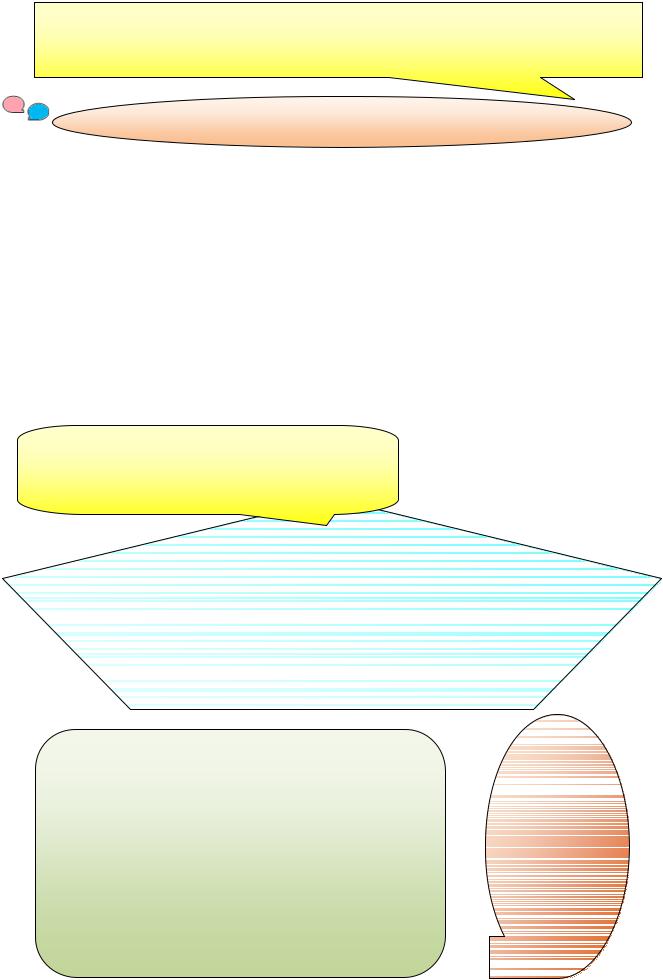
2. Say if the sentences below are true or false. If they are not true, correct them. Don’t forget to start your answer with one of these phrases:
Oh, no, it isn’t so. • I don’t think it is right. • No, it’s just wrong.
1. |
Inventors may be inspired to invent through a desire to create something |
True |
False |
|
new or better, simple altruism, or for competitive or commercial |
|
|
|
reasons. |
|
|
|
|
|
|
2. |
Misunderstandings of changing marketplaces are typical characteristics |
True |
False |
|
of successful inventors. |
|
|
3. |
Some inventions represent incompetence in science or technology. |
True |
False |
|
|
|
|
4. |
The original idea may never be fully realised as a working invention, |
True |
False |
|
perhaps because the concept is in some way unrealistic or impractical. |
|
|
5. |
History is full of examples of "glorious failure". |
True |
False |
|
|
|
|
3. Read and translate the following phrases into Russian. Make up & write down a few sentences, using the given phrases.
To have an excellent opportunity • to have plenty of free time • to be a really good engineer • to achieve excellent results • to be seldom free • to think about the meaning of life • to be a famous scientist • scientific research work • to win the first prize at the championship • to encourage one’s initiative • to master two foreign languages • to be injured at the car accident • to justify one’s hopes • it’s primary function to improve living conditions • it is governed by the executive board • to provide equipment.
1. |
Изобретатель – это человек, который создаёт или |
|
||
открывает новые методы, средства или устройства. |
||||
4. Translate |
||||
2. |
Изобретение – это процесс или |
устройство с |
||
элементами новизны. |
|
the |
||
3. |
Первоначальная идея некоторых |
изобретений |
following |
|
может остаться нереализованной из-за непрактичности |
||||
|
||||
или нереальности её применения. |
|
sentences |
||
4. |
Ограничениями к внедрению изобретения могут |
into English. |
||
являться технические или инженерные несовершенства. |
||||
|
||||
5. |
История насыщена идеями, воплощение которых |
|
||
осуществилось со временем. |
|
|
||
11
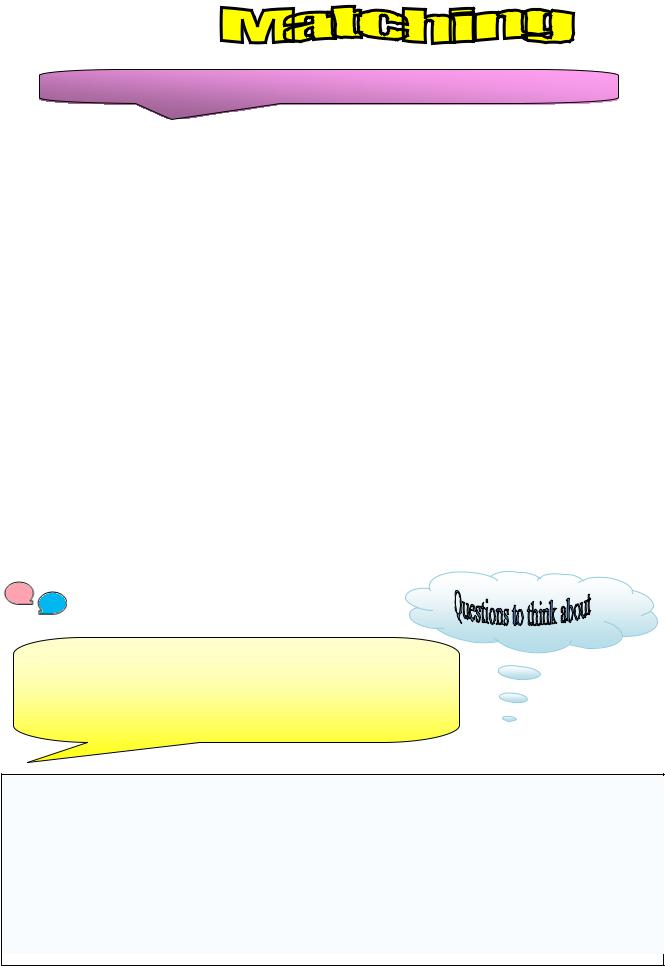
5. Choose the phrases on the right which complete the phrases on the left.
1. |
An inventor is a person who creates |
a) |
something new or better, simple altruism, or for |
|
|
competitive or commercial reasons. |
|
|
|
|
|
2. |
The word "inventor" comes from |
b) which can be overcome in time with scientific |
|
|
|
advances. |
|
3. |
Inventors may be inspired to invent |
c) the Latin verb invenire, invent-, to find. |
|
through a desire to create |
|
|
|
4. |
An invention is an object, process, or |
d) |
or discovers new methods, means or devices for |
technique |
performing a task. |
||
5. |
Some inventions also represent a radical |
e) |
which displays an element of novelty. |
breakthrough in science or technology |
|
|
|
6. |
Over time, humanity invented objects |
f) |
usually with the objective of realizing that |
and methods for accomplishing tasks which |
purpose in a faster, more efficient, easier or cheaper |
||
fulfill some purpose in a new or different |
way. |
||
manner, |
|
|
|
7. |
Any barriers to implementation may |
g) which have taken some time to reach physical |
|
simply be an issue of engineering or |
reality. |
||
technology |
|
|
|
8. |
History is full of examples of ideas |
h) which extends the boundaries of human |
|
|
|
knowledge. |
|
|
|
|
|
6. In pairs or small groups think of an object which you would like to modify or to invent. Your partner is interested in it. Answer his questions. When you have finished, change over.
1.What can you substitute to make an improvement? 2. What if you swap this for that and what happens?
3.How can you substitute the place, time, materials or people? 4. What materials, features, processes, people, products or components can you combine? 5. Where can you build synergy? 6. What part of the product could you change? And exchange for what? 7. What if you were to change the characteristics of a component?
8.What happens if you warp or exaggerate a feature or component? 9. What will happen if you modify the process in some way? 10. What other market could you use this product in? 11. Who or what else might be able to use it? 12. Who else has solved this problem? 13. What similar area of expertise might have solved this problem? 14. Is there anyone else in the company who knows how to solve this? 15. What else could we use to solve the problem? 16. Where else might this problem have been solved? 17. What other companies might know how to solve this? 18. What other industries face the same problem and what do they do about it?
12
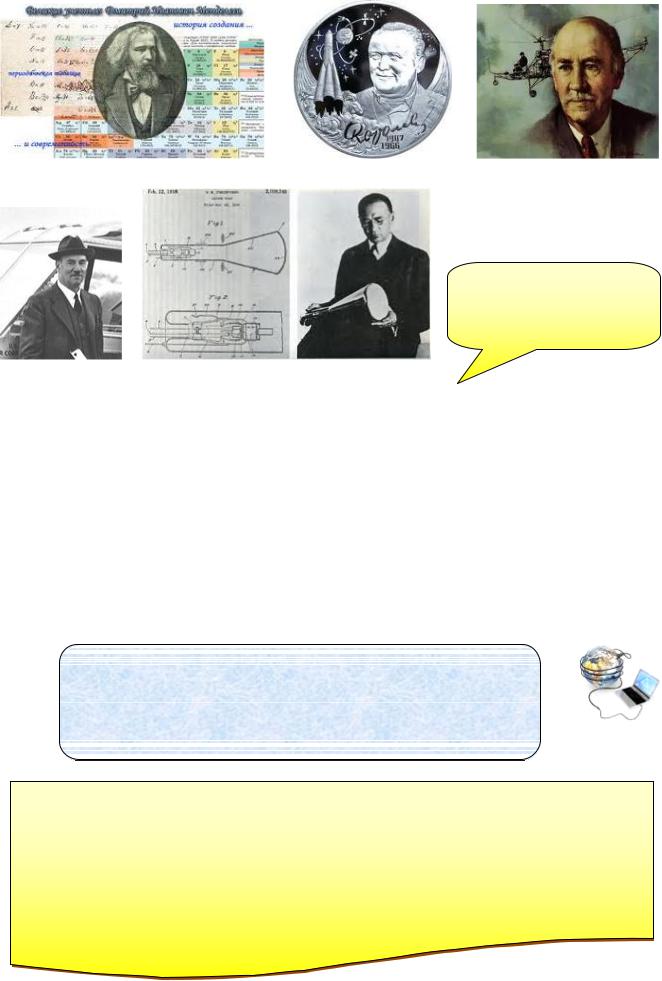
7. Choose the names on the left which complete the sentences on the right.
1. |
Sergei Pavlovich Korolev |
a) physicist and electrical engineer – invented |
|
|
|
the cathode-ray tube called the kinescope. |
|
|
|
|
|
2. |
Dmitri Ivanovich Mendeleev |
b) |
helicopter and aircraft designer. |
|
|
|
|
3. |
Vladimir Kosma Zworykin |
c) |
rocket engineer and designer, "Father of |
|
|
the space program". |
|
4. |
Igor Ivanovich Sikorsky |
d) rocket scientist and pioneer of astronautics. |
|
|
|
|
|
5. |
Konstantin Eduardovich Tsiolkovsky |
e) |
has been credited with the invention of the |
|
|
periodic tab. |
|
|
|
|
|
8. Visit the website address given below.
Make up a conversation between you and one of the inventors. http://www.youtube.com/watch?v=m3BZER-DWZE http://video.yandex.ru/#search?text=zwory http://www.youtube.com/watch?v=2m1CnIv9jBI
9. Make nouns from these verbs. Use them in your own sentences in writing. discover explore invent suggest
1.Leonardo da Vinci invented scissors! He was a brilliant inventor.
2.Yuri Gagarin was the first to explore the space.
3.Mendeleev discovered the periodic law.
4.Cancer is a modern, man-made disease caused by environmental factors such as pollution and diet, a study by University of Manchester scientists has strongly suggested.
13
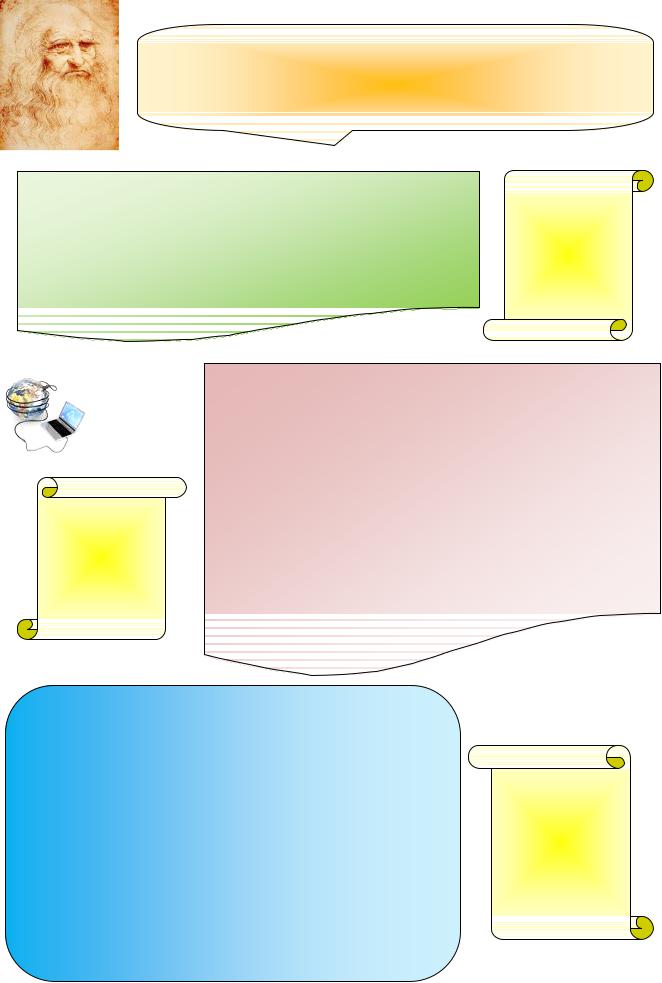
10. Visit the website address given below. Watch the clip and fill in the gaps in this script with the words in the box.
http://www.google.ru/search?q=http%3A%2F%2Fwww.videojug.com%2Finterview%2Fgettin g-rich-with-inventions-2%23can-i-modify-a-patented-product-and-call-it-an- invention+++++&ie=utf-8&oe=utf-8&aq=t&rls=org.mozilla:ru:official&client=firefox
What makes a great invention?
To me, you have to look at the word "______". Invention comes from a Latin root "to invent," and invention is saving people
_____and _____ or bringing something to market that helps people do something that they normally would find ______or with extra effort so the idea of an invention is, for me, providing a product, a good or service that enables people to______time and money.
laborious
invention
time
money
save
coffee
pigeons
tangible
lucid
imagination
What's the difference between a great idea and
an invention?
Best ideas are found usually on Sunday at New York Central Park with the guys who feed the_____. Those are always brilliant ideas. _____ shops – brilliant ideas. And chit chat. After a couple of beers there is always someone who has a great idea. An idea is just that. It's an idea. It's very general, it's_____, it's usually traded from somebody's______. An invention is where you take that idea and actually develop a _____ product that you can touch and see, or a program that actually works.
Can I have a career as an inventor?
Part inventor, part product designer, very much entrepreneur and very much you have to be your number one fan. You have to be constantly ______ and criticized and wake up with a _____ on your face that you're pursuing your dream and your craft. But yeah, you could have a job as an inventor and I think that there's an interesting ____ of inventing. What's the ______ between a good invention, a great invention and a 'why didn't I think of that?' invention? I think there's categories and the longer you practice the craft you get into that realm when you make a _____ other people will comment, "Why didn't I think of that?" or "Brilliant____". That's when you know you're doing your craft right.
smile
ridiculed
topic
aproduct idea
difference
14
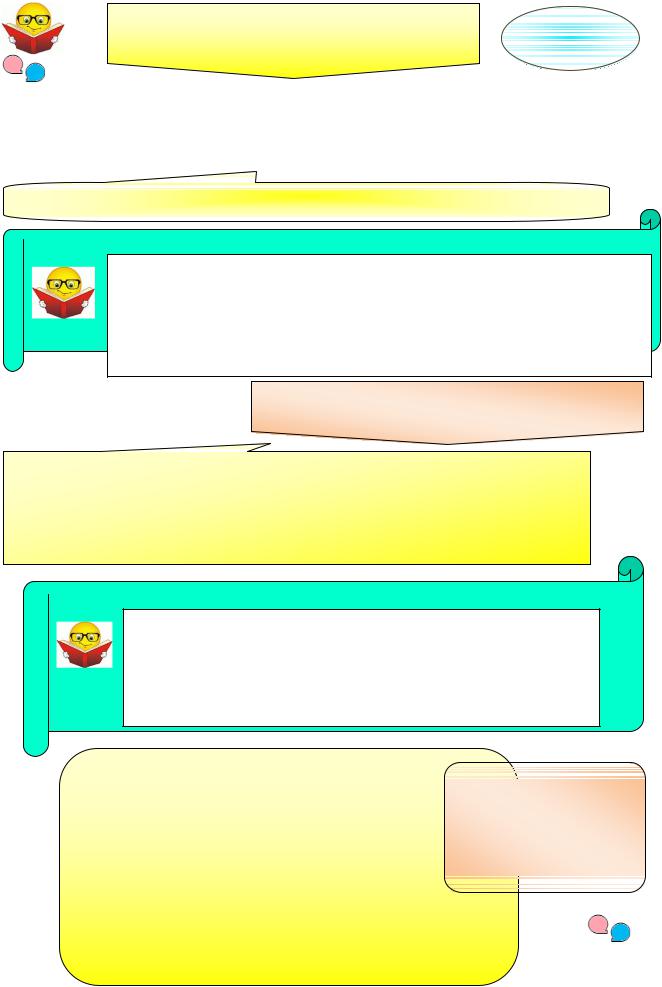
|
1. a. Match the four questions on the left with four |
Normally or |
||
|
appropriate answers on the right. |
now? |
||
|
|
|
|
|
1. |
What do you do? |
a) In a hotel in the center of city. |
|
|
2. |
What are you doing in this class? |
b) |
I work for a large plant. |
|
3. |
Where do you live? |
c) |
I’m learning English. |
|
4. |
Where are you staying? |
d) I’ve got a flat in Moscow. |
|
|
|
|
|
|
|
b. Look at the forms of the questions and explain why different tenses are used.
 Grammar tip
Grammar tip
Check
We use the Present Simple to talk about regular actions or normal situations.
I send SMS every day.
We usethe Present Continuoustotalk about a temporary situation or something that’shappening now.
I am using Nick’s phone while mine is being charged. I’m writing a message now.
For more on this, turn to ‘Grammar Reference’.
2. Use the underlined verb to complete the second sentence. Present Simple: affirmative.
1.I like chess. My flatmate likes computer games.
2.I go to Moscow University. My best friend ____ to Manchester University.
3.I study engineering. My girlfriend ____ medicine.
4.I watch films on TV. My neighbour ____ sport.
5.I do my homework on Friday. My partner ____ her homework on Sunday.
6.I listen to the radio in the car. My relative ____ to it in bed.
 Grammar tip
Grammar tip
Check
There are some verbs which are almost never used in the Present Continuous. Most of them come in these some categories:
1.Verbs of mind, e.g. think, know, understand, believe, see, agree.
2.Verbs of feeling, e.g. like, love, hate, prefer.
3.Verbs of wanting and possession, e.g. want, need, own, belong. For more on this, turn to ‘Grammar Reference’.
1. These days cars get more comfortable.
2.You are absolutely right! I am agreeing with you.
3.I don’t know anything about I-PNNI.
4.Look. He works on a new project.
5.I’m writing an email to my program buddy.
6.How often are you receiving shipments?
7.At present we have used plastic packaging.
8.We receive raw materials from our partners.
9.I am using Nick’s laptop while mine is being repaired.
10.We are collecting our new car at the weekend.
11.Antony’s is doing a project on wind farms.
12.Does this mobile phone belong to you?
3. Five of the following sentences are wrong. In pairs identify which they are and discuss why they are wrong.
15

4. Divide the words into four vessels according to their part of speech.
Adverbs
Inventor • create • discover • devices • perform • |
|
|||||||
come • inspire • desire • altruism • competitive • |
Verbs |
|||||||
commercial |
• combination • support • |
often |
• |
develop |
||||
• launch • marketplace • commercial • economic • |
|
|||||||
reward |
• |
expect • |
entrepreneurship |
• awareness |
• |
|
||
demand • successful • novelty • sometimes • earlier • |
|
|||||||
collaborations • require • concept • |
modify |
• |
Nouns |
|||||
transform • |
radical • |
breakthrough • extend |
• |
purpose |
||||
• different • manner • usually • although |
• |
useful |
• |
Adjectives |
||||
fully • |
unrealistic • impractical • express. |
|
|
|
|
|||
5. Make up sentences from the words below.
|
large |
|
long |
|
high |
Sydney |
the USA |
Brazil |
the solar system |
Everest |
Africa |
Jupiter |
South America |
Alaska |
the world |
The Nile |
Australia |
Country • planet • city • state
• river • mountain
|
adjective |
|
comparative |
|
|
superlative |
|
cheap |
cheaper |
cheapest |
|||||
small |
smaller |
smallest |
|||||
big |
bigger |
biggest |
|||||
funny |
funnier |
funniest |
|||||
early |
earlier |
earliest |
|||||
heavy |
heavier |
heaviest |
|||||
careful |
more careful |
most careful |
|||||
boring |
more boring |
most boring |
|||||
expensive |
more expensive |
most expensive |
|||||
interesting |
more interesting |
most interesting |
|||||
For more on this, turn to ‘Grammar Reference’.
Example: Sydney is the largest city in Australia.
1.Helen's car isn't very big. She wants a ____ one.
2.My job isn't very interesting. I want to do something ____ .
3.David doesn't work very hard. I work ____ .
4.Your plan isn't very good. My plan is ____ .
5.These flowers aren't very nice. The blue ones are ____ .
6.My bag isn't very heavy. Your bag is _____ .
7.I'm not very interested in art. I'm ____ in history.
8.It isn't very warm today. It was ____ yesterday.
9.Britain isn't very big. France is ____.
10.London isn't very beautiful. Paris is ____.
11.This knife isn't very sharp. Have you got a ____one?
12.People today aren't very polite. In the past they were ____.
6. Complete each space with the correct comparative forms in parentheses.
16
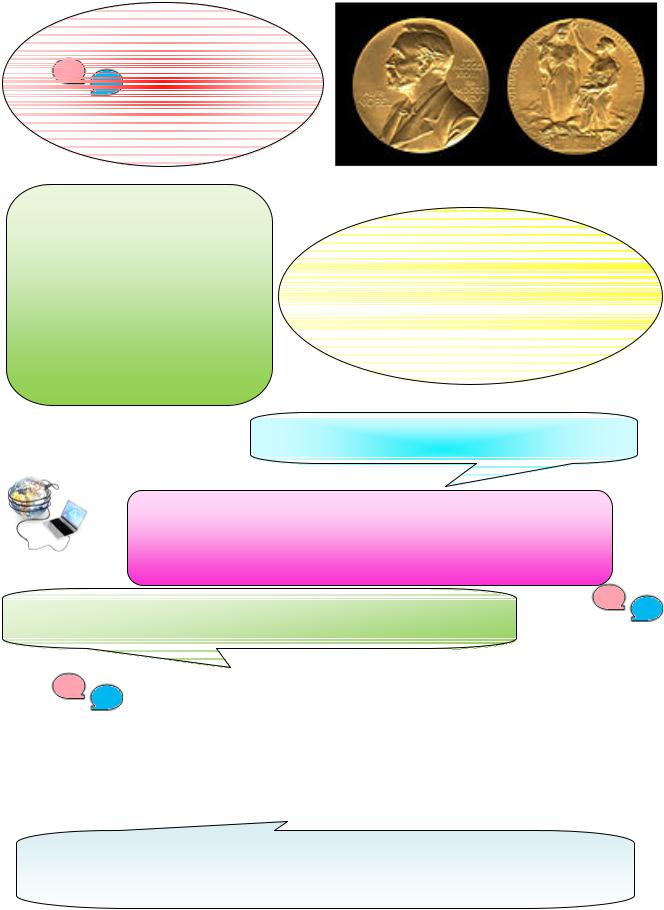
Lesson 2 |
THE NOBEL PRIZE |
"The said interest shall be divided into five equal parts, which shall be apportioned as follows: /- - -/ one part to the person who shall have made the most important discovery or invention within the field of physics...". (Excerpt from the will of Alfred Nobel)
Who was Alfred Nobel?
What Alfred Nobel wanted his dynamite to be used for?
Who can be awarded the Nobel Prize?
Would you like to be a winner of the Nobel Prize?
How can a large amount of money affect our work, our home?
1. Warm-up. Visit the website address given below.
http://www.youtube.com/watch?v=jUv_K6EJL3Y &feature=related
In pairs practice the questions and answer them.
2. Can you guess the meaning of these international words?
Dynamite • grant • organization • recipient • laureate • prize • Physics • Physiology • Medicine • Literature • medal • diploma • engineer • creative
•Nobel's instruction • fortune • Institute • finance •administration • inaugural • Swedish-Norwegian Club • potential • nomination.
3.a. What inventions do you associate these names with? Which
inventors haven’t won the prize or can’t have won the prize?
Albert Einstein |
Pierre Curie, Marie Curie |
|
|
Wilhelm Conrad Röntgen |
Ivan Petrovich Pavlov |
|
|
William Shakespeare |
Boris Pasternak |
|
|
Andrei Dmitrievich Sakharov |
Ilya Ilyich Mechnikov |
|
|
Mikhail Aleksandrovich Sholokhov |
Isaac Newton |
|
|
b. Check your answers in http://www.google.ru/#sclient=psy&hl=ru&newwindow=1&source=hp&q=the+nobel+prize+wikipedi a&aq=8&aqi=g10&aql=&oq=&pbx=1&psj=1&fp=9ff7f26ea45dbfb3&biw=700&bih=608
17
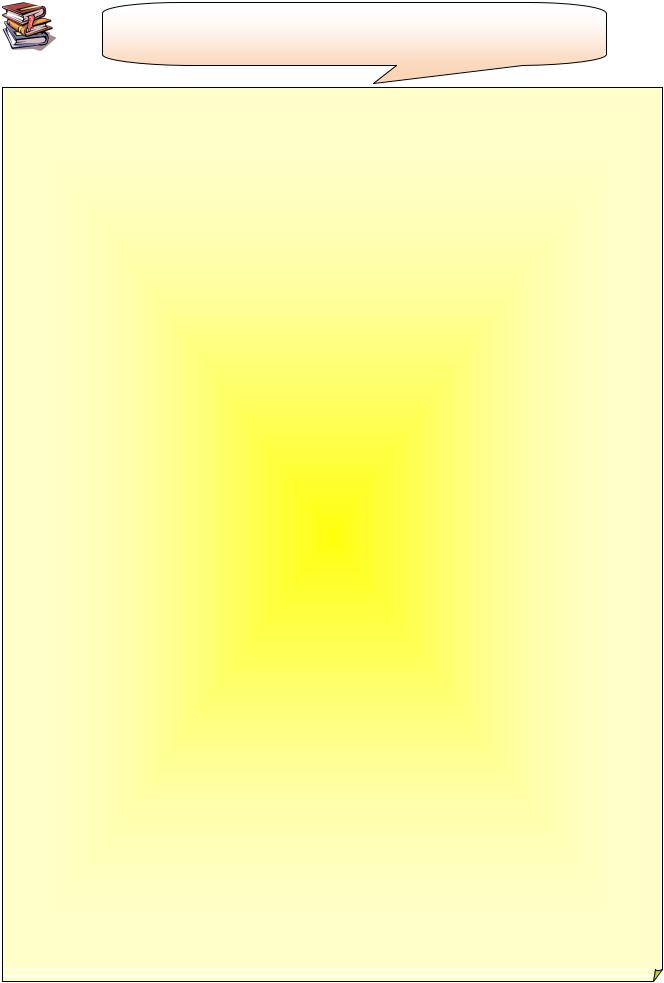
4. In pairs or small groups scan this text and make questions for the answers below. Then discuss your answers.
The Nobel Prizes are annual1 international awards2 bestowed by Scandinavian committees in recognition of cultural and scientific advances. The will3 of the Swedish chemist Alfred Nobel, the inventor of dynamite, established the prizes in 1895. The prizes in Physics, Chemistry, Physiology or Medicine, Literature, and Peace were first awarded in 1901. The Peace Prize is awarded in Oslo, Norway, while the other prizes are awarded in Stockholm, Sweden. Each Nobel Prize is regarded as the most prestigious award in its field. In 1968, Sveriges Riksbank instituted an award that is often associated with the Nobel prizes, the Sveriges Riksbank Prize in Economic Sciences in Memory of Alfred Nobel. The first such prize was awarded in 1969. Although it is not an official Nobel Prize, its announcements and presentations are made along with the other prizes.
Alfred Nobel was born on 21 October 1833 in Stockholm, Sweden, into a family of engineers. He was a chemist, engineer, and inventor. In 1894 Nobel purchased the Bofors iron and steel mill, which he made into a major armaments manufacturer. Nobel also invented ballistite, a precursor to many smokeless military explosives, especially the British smokeless powder cordite. Nobel was even involved in a patent infringement4 lawsuit over cordite5. Nobel amassed a fortune during his lifetime. Most of his wealth was from his 355 inventions, of which dynamite is the most famous.
In 1888 Alfred was astonished6 to read his own obituary, titled ‘The merchant of death is dead’, in a French newspaper. As it was Alfred's brother Ludvig who had died, the obituary7 was eight years premature. The article disconcerted8 Nobel and made him apprehensive about how he would be remembered. This inspired him to change his will. On 10 December 1896 Alfred Nobel died in his villa in San Remo, Italy, from a cerebral haemorrhage9. He was 63 years old.
To widespread astonishment, Nobel's last will specified that his fortune be used to create a series of prizes for those who confer the "greatest benefit on mankind" in physics, chemistry, peace, physiology or medicine, and literature. Nobel wrote several wills during his lifetime. The last was written over a year before he died, signed at the Swedish-Norwegian Club in Paris on 27 November 1895.
First prizes. Wilhelm Conrad Röntgen received the first Physics Prize for his discovery of X-rays. Once the Nobel Foundation and its guidelines were in place, the Nobel Committees began collecting nominations for the inaugural prizes. Subsequently10 they sent a list of preliminary candidates to the prizeawarding institutions. Originally, the Norwegian Nobel Committee appointed prominent figures including Jоrgen Lоvland, Bjоrnstjerne Bjоrnson and Johannes Steen to give the Nobel Peace Prize credibility. The committee awarded the Peace Prize to two prominent figures in the growing peace movement around the end of the 19th century: Frédéric Passy was co-founder of the Inter-Parliamentary Union and Henry Dunant was founder of the International Committee of the Red Cross. The Nobel Committee's Physics Prize shortlist cited Wilhelm Conrad Röntgen's discovery of X-rays and Philipp Lenard's work on cathode rays. The Academy of Sciences selected Röntgen for the prize. In the last decades of the 19th century many chemists had made significant contributions. Thus, with the Chemistry Prize, the Academy "was chiefly faced with merely deciding the order in which these scientists should be awarded the prize". The Academy received 20 nominations, eleven of them for Jacobus van't Hoff. Van't Hoff was awarded the prize for his contributions in chemical thermodynamics.
Nominations. Nomination forms are sent by the Nobel Committee to about 3000 individuals, usually in September the year before the prizes are awarded. These individuals are often academics working in a relevant area. For the Peace Prize, inquiries11 are sent to governments, members of international courts, professors and rectors, former Peace Prize laureates and current or former members of the Norwegian Nobel Committee. The deadline for the return of the nomination forms is 31 January of the year of the award. The Nobel Committee nominates about 300 potential laureates from these forms and additional names. The nominees are not publicly named, nor are they told that they are being considered for the prize. All nomination records for a prize are sealed12 for 50 years from the awarding of the prize.
18
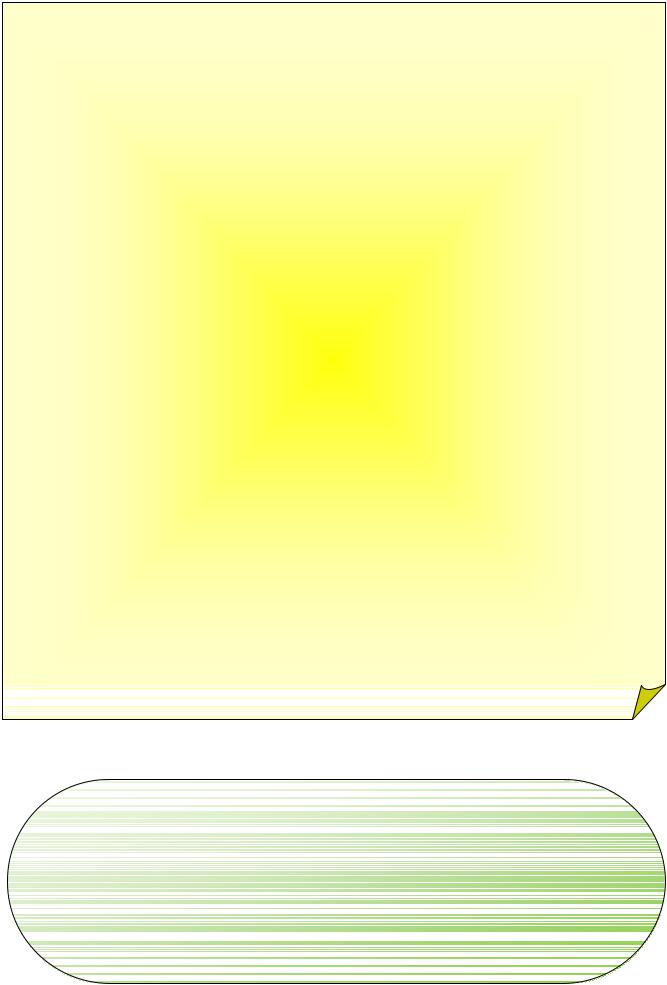
Selection. The Nobel Committee then prepares a report reflecting the advice of experts in the relevant fields. This, along with the list of preliminary candidates, is submitted to the prize-awarding institutions. The institutions meet to choose the laureate or laureates in each field by a majority vote. Their decision, which cannot be appealed, is announced immediately after the vote. A maximum of three laureates and two different works may be selected per award. Except for the Peace Prize, which can be awarded to institutions, the awards can only be given to individuals. If the Peace Prize is not awarded, the money is split among the scientific prizes. This has happened 19 times so far.
Nobel lectures. According to the statutes of the Nobel Foundation, each laureate is required to give a public lecture on a subject related to the topic of their prize. These lectures normally occur during Nobel Week (the week leading up to the award ceremony and banquet, which begins with the laureates arriving in Stockholm and normally ends with the Nobel banquet), but this is not mandatory. The laureate is only obliged to give the lecture within six months of receiving the prize. Some have happened even later. For example, US president Theodore Roosevelt won the Peace Prize in 1906 but gave his lecture in 1910, after his term in office. The lectures are organised by the same association who selected the laureates.
Medals. The Nobel Prize medals, minted by Myntverket in Sweden and the Mint of Norway since 1902, are registered trademarks of the Nobel Foundation. The medals for physics, chemistry, physiology or medicine, and literature have identical obverses, showing the image of Alfred Nobel and the years of his birth and death. Nobel's portrait also appears on the obverse of the Peace Prize medal and the medal for the Economics Prize, but with a slightly different design. For instance, the laureate's name is engraved on the rim of the Economics medal. The image on the reverse of a medal varies according to the institution awarding the prize. The reverse sides of the medals for chemistry and physics share the same design. Laureates receive a heavily decorated diploma together with a gold medal and the prize money.
Diplomas. Nobel laureates receive a diploma directly from the hands of the King of Sweden or the Chairman of the Norwegian Nobel Committee. Each diploma is uniquely designed by the prize-awarding institutions for the laureates that receive them. The diploma contains a picture and text which states the name of the laureate and normally a citation of why they received the prize. None of the Nobel Peace Prize laureates has ever had a citation on their diplomas.
Award money. The laureates are given a sum of money when they receive their prizes, in the form of a document confirming the amount awarded. The amount of prize money depends upon how much money the Nobel Foundation can award each year. The purse has increased since the 1980s, when the prize money was 880 000 SEK (c 2.6 million SEK or US$350 000 today). In 2009 the monetary award was 10 million SEK (US$1.4 million). If there are two laureates in a particular category, the award grant is divided equally between the recipients. If there are three, the awarding committee has the option of dividing the grant equally, or awarding one-half to one recipient and one-quarter to each of the others. It is not uncommon for recipients to donate prize money to benefit scientific, cultural, or humanitarian causes.
1. The Nobel Prizes. 2. The Sveriges Riksbank Prize. 3.The inventor of dynamite. 4. He was a chemist, engineer, and inventor. 5. In 1896. 6. On 27 November 1895. 7. X-rays and cathode rays. 8. The year before the prizes are awarded. 9. For 50 years from the awarding of the prize. 10. A maximum of three laureates. 11. A public lecture on a subject related to the topic of their prize. 12. Laureates receive a heavily decorated diploma together with a gold medal and the prize money. 13. US$1.4 million. 14. It is not uncommon for recipients.
19
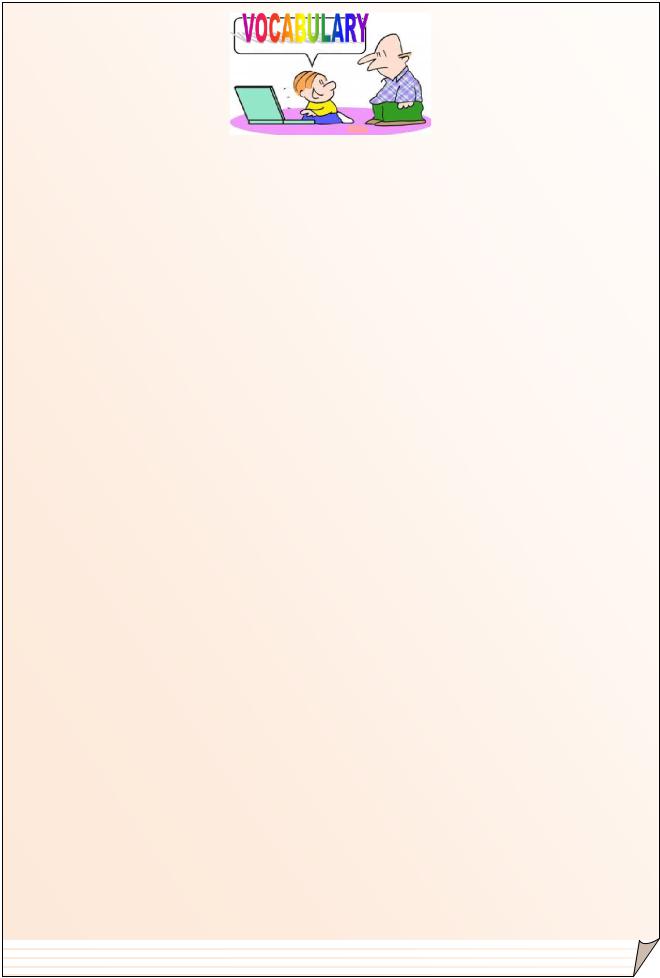
1.Annual (adj) – ежегодный, годичный, годовой.
An annual publication is a book or a magazine published yearly. – Ежегодная публикация – это книга или журнал, которые публикуются ежегодно.
2.Award (n) – присуждённая награда, премия или наказание.
For the third time since the Nobel Prizes were instituted the awards for both Physics and Chemistry have been given to British men of science. – В третий раз с тех пор, как существуют Нобелевские премии в области физики и химии, обе награды были присуждены британским учёным.
3. Will (n) – собственноручно составленное завещание (весь текст завещания написан самим завещателем, им же поставлены дата и подпись); last will, last will and testament – последняя воля, завещание.
Physics was the prize area which Alfred Nobel mentioned first in his will. – Физика была в числе первых завещаний Альфреда Нобеля.
4.Infringement (n) – нарушение (закона, клятвы), покушение, посягательство (на права, свободу).
This edict was an infringement on their autonomy. – Этот эдикт был посягательством на их право на самоуправление.
5.Cordite (n) – кордит (бездымный порох).
Cordite is a family of smokeless propellants developed in the United Kingdom – Кордит – название одного из видов нитроглицеринового бездымного пороха, разработанного в Великобритании.
6. Astonish (v) – изумлять, поражать, удивлять; to be astonished at smb.'s conduct / manners –
удивляться ч.-л. поведению, манерам; Syn.: surprise, amaze.
It astonished us that they were able to survive. – Мы были поражены, что они сумели выжить.
7.Obituary (n) – некролог, газетное объявление о ч-л. cмерти.
He published his friend’s an obituary . – Он опубликовал некролог о смерти своего друга.
8. Disconcert (v) – приводить в замешательство, сбивать с толку; нарушать спокойствие; смущать; Syn: confuse, ruffle, put out.
It disconcerted us that they had refused our offer. – Их отказ привёл нас в замешательство.
9.Haemorrhage (n) – кровоизлияние в мозг; Syn.: extravasation, hemorrhage.
An old man had a massive brain haemorrhage. – У пожилого мужчины произошло обширное внутреннее кровоизлияние в мозг.
10. Subsequently (adv) – впоследствии, позднее, позже, после, потом; Syn.: later, afterward.
Subsequently in 1901 the very first Nobel Prize in Physics was awarded to Wilhelm Röntgen for his discovery of X-rays. – Позднее, в 1901 году, самую первую Нобелевскую премию в области физики получил Вильгельм Рентген.
11. Inquiry (n) – вопрос, запрос, расспрашивание, наведение справок; Syn.: question.
You should make inquiries about a matter. – Вам следует навести справки о деле.
12. Seal (v) – скреплять печатью, запечатывать, опечатывать.
This agreement was sealed last month. – Это соглашение было скреплено печатью в прошлом месяце.
20
